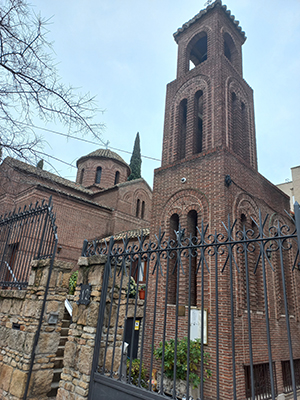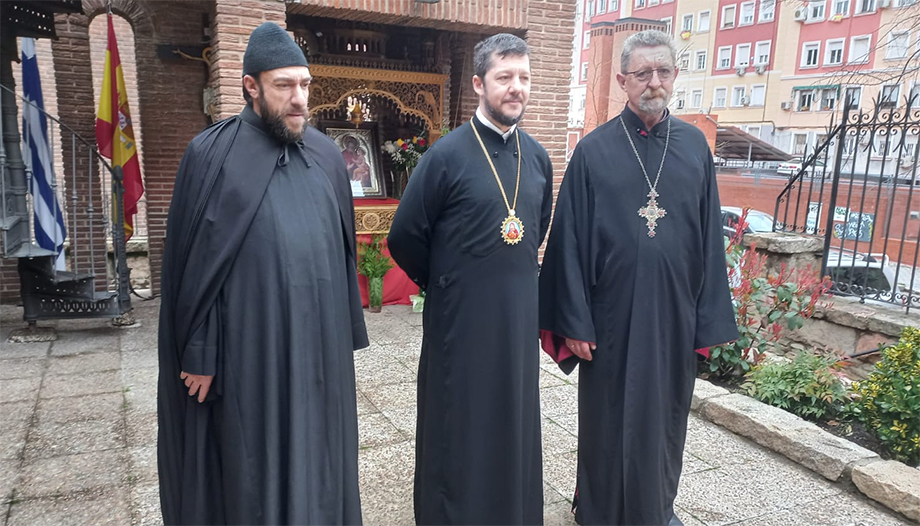Omnes has reflected these days some reactions of the Catholic hierarchy, priests and religious, and some Catholic organizations, such as ACNThe Russian President Vladimir Putin's attitude towards Ukraine, and his subsequent decision to launch a "special military operation" on the Ukrainian country.
These statements and initiatives follow the Holy Father's intense appeal to prayer and fasting during these days, especially on Ash Wednesday, the beginning of Lent, on March 2. And also his efforts in favor of peace.
For example, his visit last Friday to the Russian embassy to the Holy See to express to the ambassador "his concern about the war" in Ukraine, in an unusual gesture and despite the fact that he cancelled his engagements due to severe pain in his knee, among others, the trip planned for today to Florence.
Mention was also made of his phone call on Saturday to Ukrainian President Volodimir Zelenski to express his "deep sorrow for the tragic events" in his country, invaded by Russian troops, the Ukrainian embassy to the Holy See said.
The Holy Father also telephoned His Beatitude Sviatoslav Shevchuk, Major Archbishop of Kyiv-Halyč. He inquired about the conditions of those living in the territories most affected by the Russian military operations. and thanked the Ukrainian Greek Catholic Church "for its choice to stand by the suffering population and for making available the basement of the main cathedral of the archbishopric, which has become a real shelter."
"Violation of international legality."
Now, Omnes collects the testimony of the new Orthodox Metropolitan Archbishop Bessarion of Spain and Portugal (Ecumenical Patriarchate of Constantinople), and of Father Constantin, Ukrainian Orthodox bishop, a tradition to which the great majority of the Orthodox in the country belong.
Archbishop Bessarion, a Greek, refers to the words of Ecumenical Patriarch Bartholomew, who promptly called, at the outbreak of hostilities, His Beatitude Metropolitan Epiphanius, Primate of the Orthodox Church of Ukraine, to express "his enormous regret for this flagrant violation of any notion of international law and legality, as well as his support for the Ukrainian people fighting 'for God and for the country' and for the families of the innocent victims."
Patriarch Bartholomew "condemns this unprovoked attack by Russia against Ukraine, an independent and sovereign state of Europe, as well as the violation of human rights and the brutal violence against our fellow human beings, especially civilians," and "prays to the God of love and peace to enlighten the leaders of the Russian Federation so that they understand the tragic consequences of their decisions and actions, which may even trigger a global military conflict."
The Orthodox Patriarch has also appealed for dialogue with the leaders of all states and international organizations in a statement that reads here.
"Moscow Orthodox Church in Ukraine with Putin".

The Ukrainian Orthodox have their liturgy in the Orthodox Cathedral of Saints Andrew the Apostle and Demetrius Martyr (Madrid), where we met for a chat. Father Constantin, a Ukrainian Orthodox, has been in Spain for 22 years, is married and has two children. He recalls that this church is Greek Orthodox, and "the Ukrainian Orthodox rent it" for worship.
Virtually all Ukrainians living in Spain have relatives in Ukraine, he notes. "In our country we have three churches: one Greek Catholic, one Ukrainian Orthodox, and a third Russian Orthodox. I am Ukrainian from the Patriarchate of Constantinople."
As to whether there is a common position of the churches in Ukraine in the face of the Russian intervention, he replies, "There are differences," Father Constantin answers, "because on Ukrainian territory there is the Orthodox Church of the Moscow Patriarchate, which is supporting Putin."
In his opinion, "any kind of negotiations will not satisfy Russia, because what they want is Ukrainian territory. This is politics. I do not want to intervene in politics. For us, for priests, the main thing is to reach out by prayers to our people, to reassure their hearts and their thoughts. And to pray that this war will end as soon as possible, and there will be as few deaths as possible."
"We are encouraging the Orthodox community to pray for peace," he adds. "Right now I am coming from the Russian embassy, where our people are protesting against violence and against war. In the 22 years I have been here, I am known all over Spain. Now I am constantly getting calls asking us to pray for peace in Ukraine."
Olena, a Ukrainian Orthodox translator, says her family is "suffering, scared, living in basements, very afraid".
Catholic unity with the Pope
On Thursday, a few hours after the attack on Ukraine by Russian troops, the Vatican Secretary of State, Cardinal Pietro Parolin, stated that "there was still room to negotiate (...), to find a peaceful way out of the Russian-Ukrainian conflict."
"The tragic scenarios that everyone feared are coming true. But there is still time for good will, there is still room for negotiation, there is still room for the exercise of a wisdom that prevents the prevalence of vested interests, protects the legitimate aspirations of each and every one and spares the world the folly and horrors of war," Cardinal Parolin added.
"We believers do not lose hope in a ray of conscience of those who hold the destinies of the world in their hands. And let us continue to pray and fast - we will do so next Ash Wednesday - for peace in Ukraine and in the whole world," he concluded.
Prayer and ways to peace
On the other hand, institutions such as the Community of Sant'Egidio or the Prelature of Opus Dei have seconded the Pope's invitation, and have even proposed ways of pacification.
Monsignor Fernando Ocáriz encouraged in his Message to rely "on the power of prayer. Without the Lord, all efforts to pacify hearts are insufficient".
The prelate asked us to join "wholeheartedly in the Pope's invitation to respond to violence with prayer and fasting. In addition to the day of fasting for peace that we will experience on March 2, let us continue to implore God, many times a day, with childlike trust, for the gift of peace. Prayer and the experience of fasting bring us closer to people who are suffering deprivation and anguish, and whose future becomes uncertain." "Especially at Holy Mass and in our prayer to St. Mary, Queen of Peace, let us keep all those who are suffering very much in mind."
For his part, the founder of the Community of Sant'Egidio, Andrea Riccardi, has launched a Manifesto to which anyone who wishes can join, to reach an immediate ceasefire and urgently proclaim Kiev, the Ukrainian capital, as an "open city".
"Kiev, capital of three million inhabitants, is today a battlefield in Europe," says Andrea Riccardi, and "the civilian population, defenseless, lives in a situation of danger and terror while seeking protection in subway shelters. The weakest, from the elderly to children, or the homeless, are even more exposed. The first civilian casualties have already occurred".
"Kiev is a sanctuary city for many Christians, first of all for Orthodox Christians from all over the world," Riccardi adds. "In Kiev began the history of faith of the Ukrainian, Belarusian and Russian peoples. In Kiev Ukrainian and Russian monasticism was born. We implore those who may decide to refrain from using weapons in Kiev to declare a ceasefire in the city, to proclaim Kiev as an "open city", not to attack its inhabitants with the violence of weapons, not to violate a city to which today the whole of humanity looks. May this decision facilitate a negotiation for peace in Ukraine.
CELAM: no to destabilization
The Latin American Episcopal Council (CELAM) has expressed its concern over the situation in Ukraine, and has joined Pope Francis' appeal to political leaders, based on an examination of conscience, to put aside everything that causes suffering and destabilizes coexistence.
Miguel Cabrejos Vidarte, archbishop of Trujillo (Peru) and president of the entity, and Cardinal Odilo Scherer, archbishop of Sao Paulo (Brazil) and secretary general, reported Vatican News, the official Vatican agency.
"In union with Francis", CELAM has invited "the 22 Episcopal Conferences of Latin America and the Caribbean, the ecclesial institutions of the continent and all brothers and sisters of good will to adhere to the day of prayer and fasting for peace, called by the Bishop of Rome for next March 2 (Ash Wednesday). At the same time, CELAM encouraged to internalize the Pope's message for Lent this year, in which he calls us to never tire of doing good". Together with the Pope, they ask that "the Queen of Peace preserve the world from the madness of war," they said.
"We invoke God's tender mercy."
The Archbishop of Los Angeles, Archbishop José H. Gomez, president of the United States Conference of Catholic Bishops, has also issued a statement, in which he stresses that, in times of distress, "we invoke the tender mercy of God, to guide our steps on the path of peace."
The Mexican Episcopal Conference, for its part, has recalled the words of Cardinal Pietro Parolin, Secretary of State, who in his statement last Thursday, pointed out that "there is still time for good will, there is still room for negotiation, there is still room for the exercise of a wisdom that spares the world the folly and horrors of war".
European Bishops
On behalf of the European Bishops' Conferences, Cardinal Hollerich reiterated "fraternal closeness and solidarity with the people and institutions of Ukraine." "And sharing Pope Francis' sentiments of anguish and concern," he has made "an appeal to the Russian authorities to refrain from further hostile actions that would inflict even more suffering and disregard the principles of international law. Therefore, the Cardinal said, "we urgently call on the international community, including the European Union, to continue to seek a peaceful solution to this crisis through diplomatic dialogue".
On the other hand, the bishops of the Mediterranean, who have met in Florence at theMeeting "Mediterranean, frontier of peace"., organized by the Italian Episcopal Conferencereported by Omnes, have expressed their "concern and grief over the dramatic scenario in Ukraine."They have renewed their closeness to the Christian communities of the country. In addition, the bishops "appeal to the conscience of those with political responsibilities to lay down their arms.".
Spain, solidarity and more prayer
In Spain, the president of the Episcopal Conference, Cardinal Juan José Omella, has sent letters to the president of the Conference of Roman Catholic Bishops of Ukraine and of the Committee for the Doctrine of the Faith, Bishop Mieczysław Mokrzycki; to the president of the Synod of Bishops of the Ukrainian Greek Catholic Church, His Beatitude Sviatoslav Shevchuk; and to His Beatitude Metropolitan Epiphanius I of Kiev and All Ukraine.
The president of the CEE joins the prayer of Pope Francis, and conveys "the closeness and solidarity of all the members of the Spanish Episcopal Conference with all the people of Ukraine, which is hit by the conflict situation with Russia". Cardinal Omella also offers "our constant prayer that peace agreements may be reached soon".









